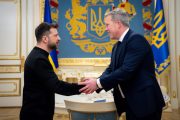
Even as conflict continues on the battlefields of the Ukraine, the war is being raged simultaneously on another front: In the courtrooms.
The European Court of Justice (ECJ), a function of the European Union, on Wednesday ruled in favor of two of Russia’s biggest bankers, stating that the EU acted without credible evidence when it moved to blacklist them over the Ukraine War. Despite the ruling, the restrictions on the two Russians remain in place for now.
As Russia Today reported, ECJ announced that Russian business moguls Mikhail Fridman and Petr Aven must be taken off the EU’s 2022 sanctions list.
The European Court of Justice reversed the initial ruling by the EU Council imposing sanctions on the co-founders of Russia’s largest private lender, Alfa Bank, consequently lifting the restrictive measures in place from February 2022 to March 2023. The original justification for the sanctions against the billionaires claimed that they “supported actions and policies that undermine or threaten the territorial integrity, sovereignty, and independence of Ukraine.”
In its Wednesday ruling, ECJ declared that “the evidence adduced by the Council is neither reliable nor credible, and that the Council’s assessments are incorrect.”
“The General Court considers that none of the reasons set out in the initial acts is sufficiently substantiated and that the inclusion of Mr Aven and Mr Fridman on the lists at issue was therefore not justified,” the court added.
In March of last year, the Council updated its wording related to the placing of sanctions on Russian businessmen. The new criteria lets Brussels blacklist Russians “involved in economic sectors providing a substantial source of revenue” to Russia’s government. The ruling reinstated the sanctions against Aven and Fridman.
Since Moscow initiated its military campaign in Ukraine in February 2022, Brussels has aimed sanctions at numerous prominent Russians, encompassing top officials, business figures, and their relatives. These penalties typically involve specific asset freezes and travel restrictions.
The United States is also willing to slap sanctions on Chinese firms assisting the Russian military, said U.S. Treasury Secretary Janet Yellen on Monday.
“We stand ready to act if we see significant violations, especially by financial institutions,” Yellen said in an interview with CNBC. “Anything that involves aiding Russia’s military in their brutal war against Ukraine is unacceptable to us and we have the ability to sanction it.”
In December, President Joe Biden signed an executive order granting the treasury secretary the power to impose sanctions on financial entities that support Russia’s military infrastructure. Yellen conceded that China has the right to maintain ties with Russia. However, if Beijing provides military assistance to Moscow, it could prompt U.S. sanctions.
Yellen spent several days last week in China, engaging in discussions with officials, including Vice Premier He Lifeng. She arrived in Guangzhou last Thursday and spent the weekend in Beijing. Yellen’s objective during the visit was to convey a firm economic message that prioritized U.S. interests while also aiming to stabilize the tense diplomatic relationship between the world’s two major superpowers.
Additionally, Yellen addressed U.S. apprehensions regarding Chinese overcapacity in the green-energy sector, including solar panels, electric vehicles, and lithium-ion batteries. The United States claims that Chinese government subsidies for these goods have exceeded its domestic demand. If Chinese manufacturers cannot sell their surplus green energy infrastructure domestically, they may opt to flood global markets with their cheaper excess products, undercutting other companies’ prices. Yellen did not dismiss the prospect of increased tariffs on Chinese imports if China did not address these issues.
Western sanctions have had a significant impact on Russia, although the overall effect is complex and evolving. Sanctions on Russian banks and financial institutions have made it harder for Russia to access international financing and manage its foreign reserves.
But Russia has attempted to evade sanctions through various means, including working with countries such as China and India. Its own large domestic market and government support for certain industries have helped soften the blow. And Russia’s position as a major energy exporter has helped the country weather some of the economic storm. High global energy prices have boosted its export revenue.
Numerous top German carmakers, such as Volkswagen and Daimler Truck, halted their trade activities with Russia and eventually withdrew from the country altogether, leading to the loss of a profitable market. The gap left by German car manufacturers was rapidly occupied by Chinese brands, which constituted more than 90 percent of all car imports to Russia last year.
Putin’s top economic advisor, Maksim Oreshkin, warned in December that “companies like Mercedes and BMW may fade into history in ten years” because they have “neither the market nor the technological advantage that they had five to ten years ago.”
In short, Russia and China are showing that they are no longer as vulnerable to the Western threat of sanctions as they once were.





